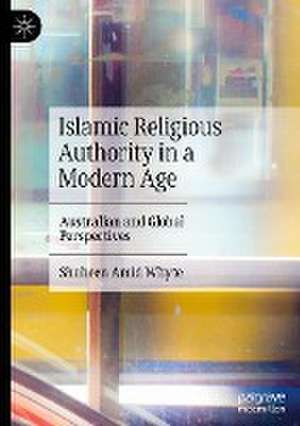Islamic Religious Authority in a Modern Age: Australian and Global Perspectives
Autor Shaheen Amid Whyteen Limba Engleză Hardback – 23 ian 2024
Preț: 701.25 lei
Preț vechi: 825.01 lei
-15% Nou
Puncte Express: 1052
Preț estimativ în valută:
134.19€ • 143.49$ • 111.88£
134.19€ • 143.49$ • 111.88£
Carte tipărită la comandă
Livrare economică 17 aprilie-01 mai
Preluare comenzi: 021 569.72.76
Specificații
ISBN-13: 9789819979301
ISBN-10: 9819979307
Pagini: 310
Ilustrații: XIII, 310 p. 22 illus., 21 illus. in color.
Dimensiuni: 148 x 210 mm
Greutate: 0.54 kg
Ediția:1st ed. 2024
Editura: Springer Nature Singapore
Colecția Palgrave Macmillan
Locul publicării:Singapore, Singapore
ISBN-10: 9819979307
Pagini: 310
Ilustrații: XIII, 310 p. 22 illus., 21 illus. in color.
Dimensiuni: 148 x 210 mm
Greutate: 0.54 kg
Ediția:1st ed. 2024
Editura: Springer Nature Singapore
Colecția Palgrave Macmillan
Locul publicării:Singapore, Singapore
Cuprins
Chapter 1: Introduction.- Chapter 2: The Ulama: History, Institutions and Modernity.- Chapter 3: Defining Legitimate Authority.- Chapter 4: Islamic Religious Authority in Australia.- Chapter 5: Collective Religious Authorities.- Chapter 6: Exercising Religious Authority.- Chapter 7: The Role and Authority of Fatwas in Australia.- Chapter 8: Localising Islam: Recruitment, Training and Funding of Imams and ScholarsChapter.- 9: Conclusion.
Notă biografică
Dr Shaheen Whyte is a Research Fellow at the Centre for Islamic Studies and Civilisation, Charles Sturt University. He holds a PhD from Deakin University, Australia. His research focuses on Islamic religious authority, Muslim minorities in the West, Islamic law and Middle Eastern politics.
Textul de pe ultima copertă
“Shaheen Whyte’s Islamic Religious Authority in a Modern Age is an engaging and authoritative study of the history, development, diverse roles and authority of Muslim religious leaders in Australia.”
- John L. Esposito, Distinguished University Professor, Georgetown University
“In this ground-breaking work, the author presents the first in-depth empirical study of Islamic religious authority in Australia. With meticulous research and a keen eye for detail, the book offers valuable insights into the nature and function of ulama and the broader phenomenon of Islamic religious authority. A must-read for anyone seeking a comprehensive understanding of religious dynamics in the Australian Muslim community.”
- Professor Mohamad Abdalla AM, Director, Centre for Islamic Thought and Education, University of South Australia
“This ground-breaking book transcends conventional boundaries by delving into the intricate dynamics between traditional ulama, Western academics, Muslim intellectuals, and religious professionals. It is an indispensable resource for anyone seeking a deeper understanding of Islamic religious authority in Australia.”
- Zuleyha Keskin, Associate Professor, Centre for Islamic Studies and Civilisation, Charles Sturt University
This book situates Australian Muslim experiences of religious authority within the global context of Islam in the modern world. While drawing on examples of Muslim-majority states, new empirical findings indicate the growing diversity of Muslim religious actors in Australia, as well as the contextual realities shaping the way religious authority is legitimised and contested in democratic and authoritarian environments. In particular, the study challenges homogenous articulations of Islamic religious authority in unearthing new voices, epistemologies and socio-political factors shaping Muslim attitudes and experiences of religious authority. The book fills important gaps in the field, such as intra-Muslim relations, female religious authority, digital Islam and the relationship between traditional ulama, reformists and Muslim intellectuals in the West.
Dr Shaheen Whyte is a Research Fellow at the Centre for Islamic Studies and Civilisation, Charles Sturt University. He holds a PhD from Deakin University, Australia. His research focuses on Islamic religious authority, Muslim minorities in the West, Islamic law and Middle Eastern politics.
“In this ground-breaking work, the author presents the first in-depth empirical study of Islamic religious authority in Australia. With meticulous research and a keen eye for detail, the book offers valuable insights into the nature and function of ulama and the broader phenomenon of Islamic religious authority. A must-read for anyone seeking a comprehensive understanding of religious dynamics in the Australian Muslim community.”
- Professor Mohamad Abdalla AM, Director, Centre for Islamic Thought and Education, University of South Australia
“This ground-breaking book transcends conventional boundaries by delving into the intricate dynamics between traditional ulama, Western academics, Muslim intellectuals, and religious professionals. It is an indispensable resource for anyone seeking a deeper understanding of Islamic religious authority in Australia.”
- Zuleyha Keskin, Associate Professor, Centre for Islamic Studies and Civilisation, Charles Sturt University
This book situates Australian Muslim experiences of religious authority within the global context of Islam in the modern world. While drawing on examples of Muslim-majority states, new empirical findings indicate the growing diversity of Muslim religious actors in Australia, as well as the contextual realities shaping the way religious authority is legitimised and contested in democratic and authoritarian environments. In particular, the study challenges homogenous articulations of Islamic religious authority in unearthing new voices, epistemologies and socio-political factors shaping Muslim attitudes and experiences of religious authority. The book fills important gaps in the field, such as intra-Muslim relations, female religious authority, digital Islam and the relationship between traditional ulama, reformists and Muslim intellectuals in the West.
Dr Shaheen Whyte is a Research Fellow at the Centre for Islamic Studies and Civilisation, Charles Sturt University. He holds a PhD from Deakin University, Australia. His research focuses on Islamic religious authority, Muslim minorities in the West, Islamic law and Middle Eastern politics.
Caracteristici
Interdisciplinary and contextually robust analysis of Islamic religious authority beyond ulama-state relations Dissects the interplay between traditional ulama, academics, intellectuals and religious professionals Offers the first in-depth empirical study of Islamic religious authority in Australia
